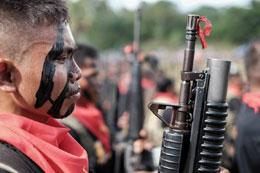Air strikes against rebels hit civilian communities

A human rights group based in Canada has asked that country’s Foreign Affairs ministry to inquire if helicopters sold to the Philippine military are being used in aerial strikes that have alleged targeted civilian communities.
Bern Jagunos of the International Coalition on Human Rights in the Philippines wrote to Canadian Minister of Foreign Affairs Chrystia Freeland following reports that air strikes during operations against communist rebels had razed a forest and destroyed farms tilled by indigenous people in the town of Malibcong, Abra.
The Malibcong bombings and other incidents reported in Compostela Valley and Maguindanao provinces followed President Rodrigo Duterte’s order to the military early this month to “go ahead, flatten the hills” by launching air strikes against the New People’s Army and “If there’s collateral damage, pasensiya (too bad).”
While acknowledging that no civilian deaths were caused by the bombardment, Jagunos said they have terrorized communities and sent hundreds of families fleeing their homes.
Jagunos reminded Freeland that they had raised these concerns as early as 2014, when the Canadian government announced the sale of eight Bell 412EP choppers to the Philippines, five of which have been deployed as combat utility helicopters.
While assurances were given then that the sale of the aircraft complied with Canada’s military export control guidelines, she wanted to know, “has there been follow-up to ensure respect of the guidelines?”
“Additionally, we’ve learned that another Canadian company, Calgary-based Eagle Copters Ltd., has been involved in another helicopter deal to the Philippines,” Jagunos pointed out.
“We strongly urge the Canadian government to assess whether the criteria for the sale of the helicopters are being observed by the Philippine Army; we call on the Canadian government to suspend all sales of military goods and all defense-related assistance to and cooperation with the Philippine Government and we urge the Canadian government to call on President Duterte to put an immediate stop to the military aerial bombings on civilian communities and instead to vigorously pursue the continuation of the Peace Talks between the Government of the Philippines and the National Democratic Front of the Philippines,” Jagunos said.
The Asia Pacific Coordinating Committee for Human Rights in the Philippines (APCHRP) has strongly condemns the bombing and shelling by four jet fighter planes of the Armed Forces of the Philippines (AFP) in indigenous people’s communities in Malibcong, Abra as part of its military campaign against the New People’s Army.
On March 16, AFP’s 24th IBPA (short for Infantry Battalion of the Philippine Army) dropped at least 14 bombs in Malibcong, Abra that affected at least 56 families, including 200 children, which greatly alarmed human rights justice and peace advocates, church people and ecumenical organizations at the national and regional level. The aerial strikes caused forest fires in the barangays (villages) of Lat-ey and Bangilo, damaged fields, endangered civilians and forced schools to suspend classes.
While the AFP denies the bombings and insists that the NPA caused the forest fires, reports from the ground by the quick reaction team of the Cordillera Human Rights Alliance (CHRA) and the villagers themselves revealed that four fighter jets of the AFP were seen circling the communities and subsequently dropping the bombs.
These abhorrent acts show the complete disregard of the Philippine military for the life and livelihood of civilians especially poor, peasants and indigenous peoples in the countryside. President Duterte’s declaration of temporary termination of the peace talks between the Philippine government and the National Democratic Front of the Philippines (NDFP) in February to force the revolutionary forces to capitulate is now wreaking havoc with impunity on the people, the group said.
“When will the Duterte government learn that all-out war solves nothing but instead only heightens the resolve of the poor, deprived and oppressed Filipinos to further advance the struggle for justice, human rights and lasting peace?”
The APCHRP, a regional support group for human right in the Philippines, is calling on the Duterte government to immediately stop the bombing of civilian communities in Abra. It should also end its all-out war policy, which gains nothing but intensify state terror attacks among the people.
The Filipino people’s demand for just and lasting peace – that will ensure land, livelihood and foods at their table – are compelling reasons to continue the peace talks with the hopes of addressing the root causes of poverty, strife and forced migration in their country, it said.
The conflict, which began nearly 50 years ago with the Communist Party of the Philippines (CPP) and the NPA, its armed wing, has claimed an estimated 30,000 lives.
The rebels, who say they will not give up arms even if a deal is reached, have accused the country's military of using Mr Duterte's drug war as a pretext to mount operations in rebel areas amid ceasefires.
They strongly oppose the US military presence in the Philippines and have in the past killed American service personnel stationed in the country.
Since the 1980s they have entered into talks with successive governments, but a peace deal has remained elusive.









